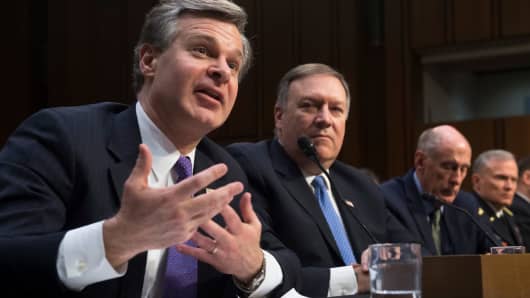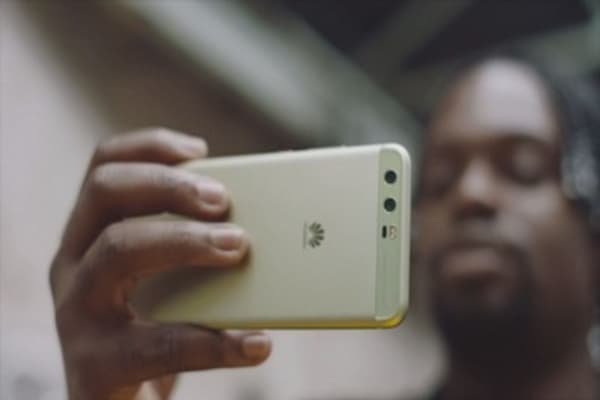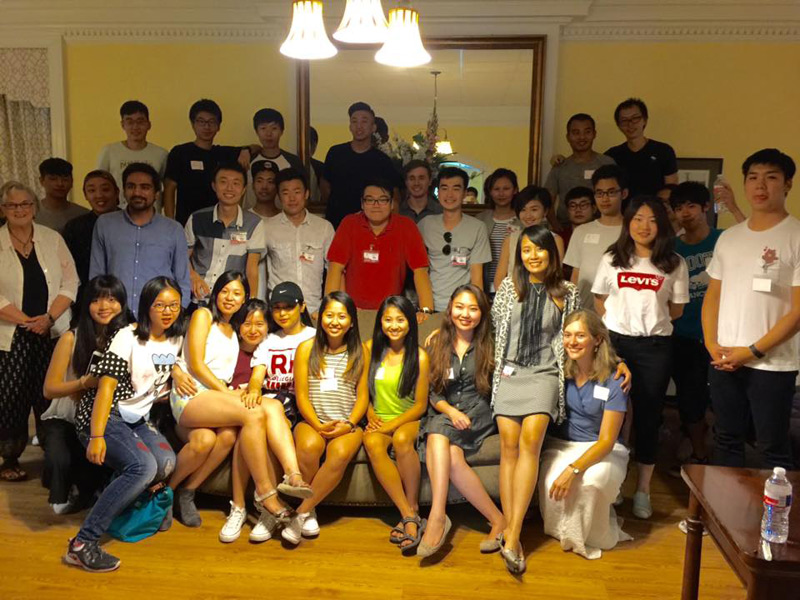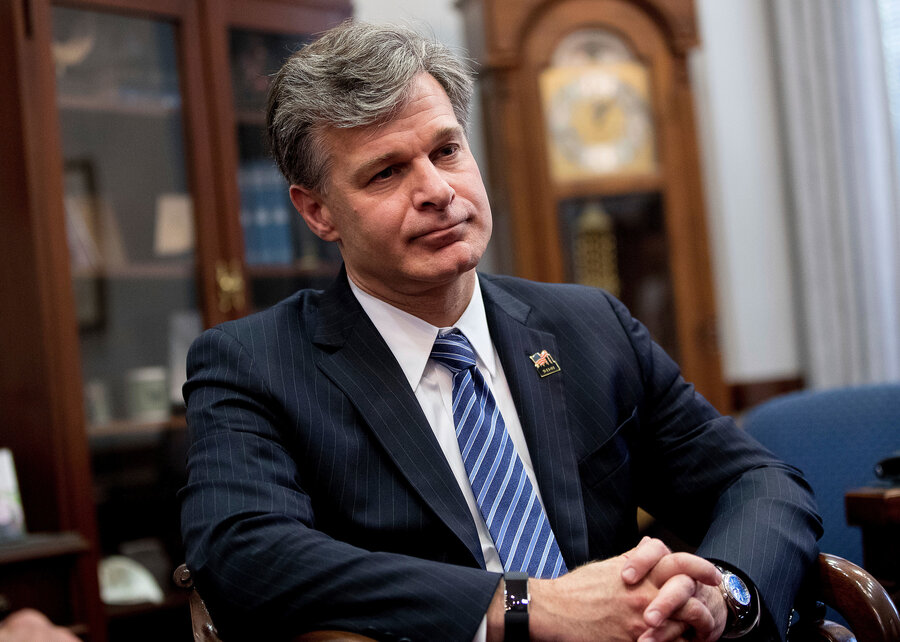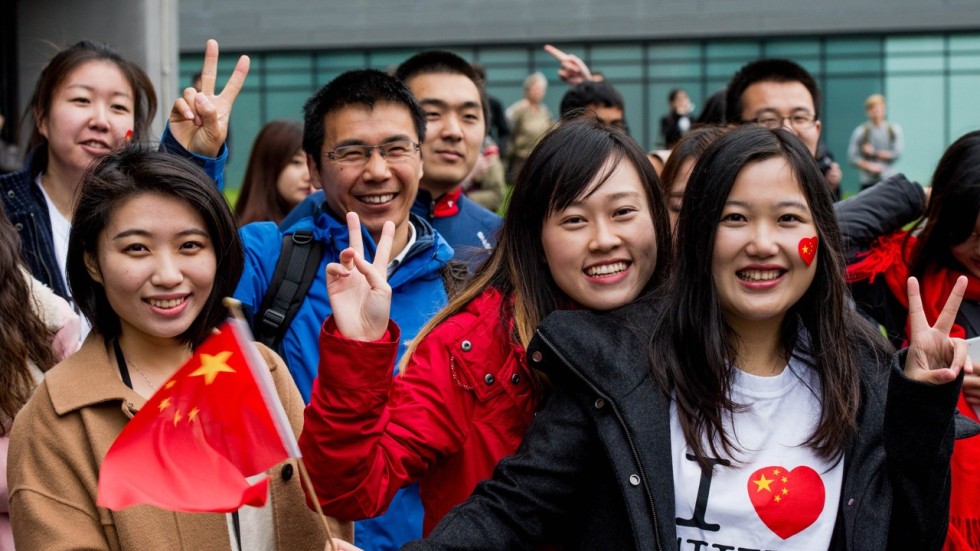By MICHAEL BALSAMO

FBI Director Christopher Wray, standing with Commerce Secretary Wilbur Ross (left) and Acting Attorney General Matthew Whitaker, remarks on the charges against Huawei during a press conference today at the Department of Justice in Washington, D.C.
WASHINGTON — The Justice Department unsealed criminal charges Monday against Chinese tech giant Huawei, two of its subsidiaries and a top executive, who are accused of misleading banks about the company’s business and violating U.S. sanctions.
The company is also charged in a separate case with stealing trade secrets from T-Mobile, according to federal prosecutors.
Prosecutors are seeking to extradite the company’s chief financial officer, Meng Wanzhou, and allege she committed fraud by misleading banks about Huawei’s business dealings in Iran.
She was arrested on Dec. 1 in Canada.
The criminal charges in Brooklyn and Seattle come as trade talks between China and the U.S. are scheduled for this week.
“As I told high-level Chinese law enforcement officials in August we need more law enforcement cooperation with China,” acting Attorney General Matt Whitaker said at a news conference with other Cabinet officials, including Commerce Secretary Wilbur Ross and Homeland Security Secretary Kirstjen Nielsen.
The criminal charges in Brooklyn and Seattle come as trade talks between China and the U.S. are scheduled for this week.
“As I told high-level Chinese law enforcement officials in August we need more law enforcement cooperation with China,” acting Attorney General Matt Whitaker said at a news conference with other Cabinet officials, including Commerce Secretary Wilbur Ross and Homeland Security Secretary Kirstjen Nielsen.
“China should be concerned about criminal activities by Chinese companies and China should take action.”
U.S. prosecutors charge that Huawei used a Hong Kong shell company to sell equipment in Iran in violation of U.S. sanctions.
U.S. prosecutors charge that Huawei used a Hong Kong shell company to sell equipment in Iran in violation of U.S. sanctions.
Huawei had done business in Iran through a Hong Kong company called Skycom and Meng misled U.S. banks into believing the two companies were separate, according to the Justice Department.
The announcement Monday includes a 10-count grand jury indictment in Seattle, and a separate 13-count case from prosecutors in the Eastern District of New York.
“As you can tell from the number and magnitude of the charges, Huawei and its senior executives repeatedly refused to respect U.S. law and standard international business practices,” said FBI Director Chris Wray.
A Huawei spokesman did not immediately return phone messages seeking comment.
Huawei is the world’s biggest supplier of network gear used by phone and internet companies and has long been a front for spying by the Chinese military and security services.
Prosecutors also allege that Huawei stole trade secrets, including the technology behind a robotic device that T-Mobile used to test smartphones, prosecutors said.
The announcement Monday includes a 10-count grand jury indictment in Seattle, and a separate 13-count case from prosecutors in the Eastern District of New York.
“As you can tell from the number and magnitude of the charges, Huawei and its senior executives repeatedly refused to respect U.S. law and standard international business practices,” said FBI Director Chris Wray.
A Huawei spokesman did not immediately return phone messages seeking comment.
Huawei is the world’s biggest supplier of network gear used by phone and internet companies and has long been a front for spying by the Chinese military and security services.
Prosecutors also allege that Huawei stole trade secrets, including the technology behind a robotic device that T-Mobile used to test smartphones, prosecutors said.
A jury in Seattle ruled that Huawei had misappropriated the robotic technology from T-Mobile’s lab in Washington state.
Meng was arrested in Canada because the U.S. and China don’t have an extradition treaty.
Meng was arrested in Canada because the U.S. and China don’t have an extradition treaty.
But new rules enacted in the past few years have made it easier for U.S. prosecutors to indict overseas corporate defendants without coordinating with foreign governments, said Ronald Cheng, a partner with the O’Melveny and Myers law office in Los Angeles and former U.S. judicial attache in Beijing.
Because it’s usually difficult to go after corporate officers, Chinese companies accused of IP theft need to worry more about asset forfeiture, which has in some cases been considerable.
Because it’s usually difficult to go after corporate officers, Chinese companies accused of IP theft need to worry more about asset forfeiture, which has in some cases been considerable.
In July, the Chinese wind turbine maker Sinovel Wind Group LLC was ordered to pay more than $50 million in restitution after being convicted of stealing trade secrets from the U.S. company AMSC.
Cheng, who was reached in Hong Kong, said there’s considerable concern among Chinese business executives about stepped up enforcement in such cases, which began in earnest with the Obama administration, including a 2014 indictment alleging theft of solar power trade secrets.
“I think the government would say that this is part of a large pattern of conduct” by Chinese companies, Cheng said of Monday’s indictments.
The Huawei case has set off a diplomatic spat with the three nations, which has threatened to complicate ties between the U.S. and Canada.
Cheng, who was reached in Hong Kong, said there’s considerable concern among Chinese business executives about stepped up enforcement in such cases, which began in earnest with the Obama administration, including a 2014 indictment alleging theft of solar power trade secrets.
“I think the government would say that this is part of a large pattern of conduct” by Chinese companies, Cheng said of Monday’s indictments.
The Huawei case has set off a diplomatic spat with the three nations, which has threatened to complicate ties between the U.S. and Canada.
Donald Trump said he would get involved in the Huawei case if it would help produce a trade agreement with China and told Reuters in an interview in December that he would “intervene if I thought it was necessary.”
The arrest of Meng, the daughter of Huawei’s founder at Vancouver’s airport, has in particular led to the worst relations between Canada and China since the Tiananmen Square massacre in 1989.
The arrest of Meng, the daughter of Huawei’s founder at Vancouver’s airport, has in particular led to the worst relations between Canada and China since the Tiananmen Square massacre in 1989.
China detained two Canadians shortly after Meng’s arrest in an apparent attempt to pressure Canada to release her.
A Chinese court also sentenced a third Canadian to death in a sudden retrial of a drug case, overturning a 15-year prison term handed down earlier.
David Martin, Meng’s lawyer in Canada, didn’t immediately respond to a message seeking comment.
David Martin, Meng’s lawyer in Canada, didn’t immediately respond to a message seeking comment.
Meng is out on bail in Vancouver and is due back in court Feb. 6 as she awaits extradition proceedings to begin.
Canada arrested Meng at the request of the United States.
Canada arrested Meng at the request of the United States.
The Chinese have been furious at Canada ever since and arrested Canadian ex-diplomat Michael Kovrig and businessman Michael Spavor on Dec. 10 on vague allegations of endangering national security.

